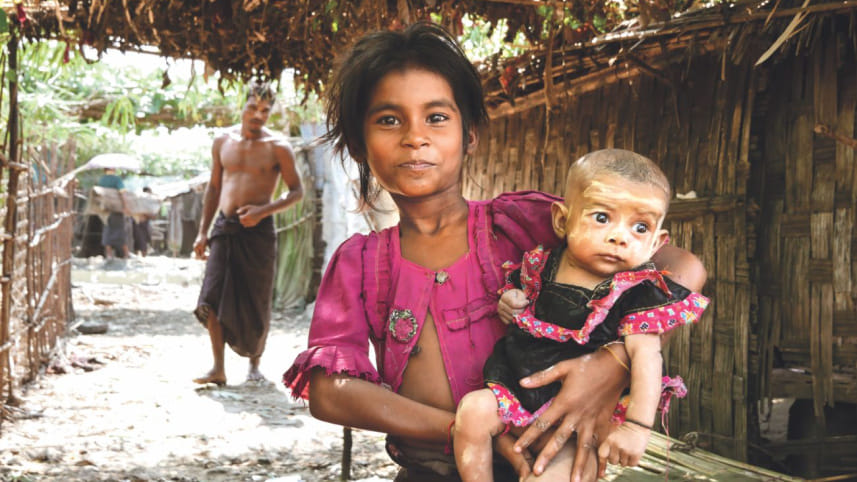LONG-TERM SOLUTIONS REMAIN ELUSIVE

Rakhine State: A strange calm has settled on the northern townships of Myanmar's Rakhine State. Hints of the terrible violence that swept through the area in August 2017 can still be seen in the razed villages and the blackened palm tree stumps. But there is little trace of the 700,000 Rohingya Muslims who fled late last year, most of whom are now living in Bangladesh.
Although the visible scars may be slowly fading, the invisible ones are not. The trauma of what happened a year ago is still felt by all communities. Economic activity is down and Muslims continue to face travel and other restrictions, severely limiting their access to services and livelihoods.
Rakhine is one of the most economically and socially deprived regions of Myanmar, and the lack of development is felt across all ethnic groups. According to the UN, more than 690,000 people in Rakhine State require humanitarian assistance, the majority of them – some 595,000 – being stateless Muslims (i.e. Rohingya). More than 360,000 children from all communities in Rakhine are deemed to require humanitarian assistance.
Security and bureaucratic obstacles mean that delivering help to those in need is hugely challenging. But in recent months, travel restrictions have sufficiently eased for UNICEF staff to get a clearer idea of the situation confronting children.
A UNICEF mission to Maungdaw in July 2018 reported that 210 out of 222 schools were open, but with sharply reduced student attendance. One primary school which had 150 students last year now has just 50 still attending. Elsewhere, the UNICEF team noted that some classrooms lacked desks and other furniture, and saw a need for investment in teaching staff and school infrastructure.
Other concerns noted by the mission focused on food insecurity (with the risk of malnutrition among young children), as well as a high school-dropout rate and a range of child protection issues.
Between January and June 2018, more than 900 individual cases of child protection violations were reported across Rakhine, including cases of children who were unaccompanied or separated; children who experienced sexual and physical violence; and children who had come into conflict with the law after trying to leave Myanmar without authorisation.
The picture is little more reassuring in the camps for internally- displaced people (IDPs) in central Rakhine, where more than125,000 Rohingya people have been confined since an earlier bout of inter-communal violence in 2012.

“You have an overwhelming impression of people suffering”, says one UNICEF staff. “Six years on, people in the camps are starting to lose hope that their lives will ever return to normal. For younger children, confinement is the only reality they have ever known.”
The Government of Myanmar is developing plans to close the IDP camps in line with the recommendations of the Advisory Commission on Rakhine State. The UN has offered technical support to ensure adherence to international guidelines and standards, including facilitating camp inhabitants' return to their places of origin or choice.
Despite the challenging circumstances in Rakhine, the work of UNICEF and its partners from both government and civil society has continued and even broadened. In northern Rakhine, child protection, health and nutrition activities are ongoing, along with additional WASH and education construction and rehabilitation projects.
The May 2018 visit by the Special Representative of the UN Secretary-General (SRSG) for Children and Armed Conflict, Virginia Gamba, reinvigorated the work of the Monitoring and Reporting Mechanism, set up to gather information on violations committed against children, with parties to the conflict reaffirming their commitment and engagement. A request has been made by both the SRSG and the Country Task Force on Monitoring and Reporting for greater access to conflict-affected areas, including northern Rakhine, to provide more balanced information and evidence in relation to the events that took place a year ago.
In central Rakhine, UNICEF continues to support the provision of basic services for many inhabitants of IDP camps, including those in the hard-to-reach areas of Pauktaw, Myebon and Kyauk Taw.

“Given that we are now seeing increased access for our staff as well as those of other UN agencies and INGO partners, there are opportunities for UNICEF to step up its assistance throughout Rakhine State, addressing both humanitarian and development needs,” says Mandie Alexander, who heads UNICEF's Rakhine Field Office. “We need sustained access to all children who are out of reach and unprotected in northern Rakhine – and any child across the state who requires assistance.”
UNICEF's work provides immediate support but unless durable solutions allow for a permanent end to intercommunal tensions and violence in Rakhine State, communities will continue to remain vulnerable and require assistance.
“UNICEF stands ready to support the government to implement the recommendations made by the Advisory Commission on Rakhine State,” says UNICEF Myanmar Representative, June Kunugi. “In line with the Convention on the Rights of the Child, all children must be protected from all forms of violence and given access to basic services and support. Working with and for children is the key to increasing social stability and cohesion over time.”



 For all latest news, follow The Daily Star's Google News channel.
For all latest news, follow The Daily Star's Google News channel.
Comments